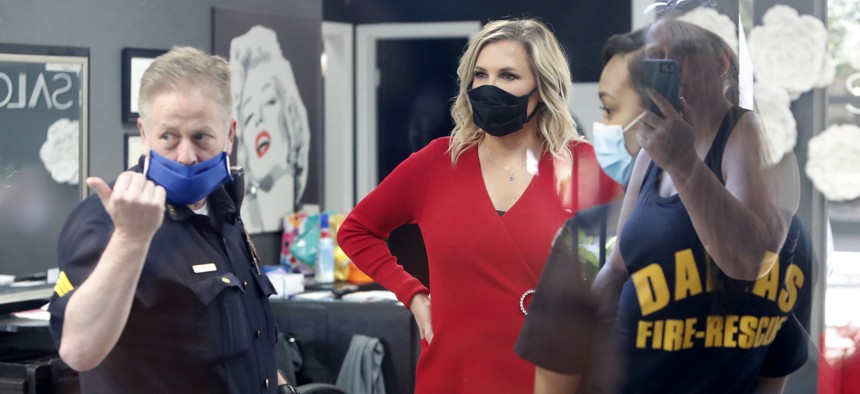Texas Does Away with Jail Time for Violation of Coronavirus Orders

Amid concerns of the spread of COVID-19, salon owner Shelley Luther, center, listens to Dallas City officials as a reflection of a supporter filming them is seen from outside Luther's reopened Salon A la Mode in Dallas, Friday, April 24, 2020. AP Photo/LM Otero
Gov. Greg Abbott’s reversal stands in contrast to strict enforcement in Hawaii and some other states as leaders continue to grapple with the virus outbreak.
Texans who violate state or local coronavirus restrictions will no longer face jail time after Gov. Greg Abbott modified executive orders Thursday to eliminate confinement as a punishment.
The about-face comes after furor reached a fever pitch over the jailing of a Dallas salon owner who was found in contempt of court for keeping her business open in violation of a judge’s restraining order. The salon owner, Shelley Luther, was freed from jail the same day after the Texas Supreme Court ordered her release.
“Throwing Texans in jail who have had their businesses shut down through no fault of their own is nonsensical, and I will not allow it to happen,” Abbott said.
The governor said his order would be applied retroactively back to April 2 and would supersede local orders. In his announcement, Abbott also cited the arrests of two Laredo women who were charged in separate undercover operations for violation of the city’s stay-at-home order, which required non-essential businesses to remain closed. One woman allegedly offered an undercover police officer nail services in her home and the other was accused of offering eyelash services to an undercover officer.
At least 35,000 Covid-19 cases and 973 deaths have been reported in Texas, according to the state health department.
The Texas reversal stands in contrast to Hawaii’s steadfast enforcement of a 14-day quarantine order for any new arrivals to the island state. Authorities are going as far as to check with hotels to ensure tourists remain in lockdown and have arrested at least 20 people on charges of violating quarantine orders.
Concerned that tourists are taking advantage of cheap flights to Hawaii and then flouting the state’s rules, some lawmakers even considered the possibility of using ankle monitors or other surveillance technology to enforce the orders. Those measures were put on hold after the state’s attorney general raised concerns.
Exactly how far police should go in the enforcement of stay-at-home orders and restrictions on business operations has become a divisive issue. Protestors, including some carrying firearms, have gathered in state capitols to push back against restrictions they say are harming their businesses and livelihoods.
Jails and prisons have become a breeding ground for infections, and authorities in some locations are proactively releasing thousands of inmates in an attempt to limit the spread of the virus. So while police departments across the country have made some arrests for violation of stay-at-home orders, authorities have largely attempted to limit jailing people for the offenses.
In New York City, police were criticized last weekend over what some called disparate enforcement of social distancing orders, treating white and minority communities differently. Police handed out face masks to people lounging in parks. Meanwhile, videos surfaced of New York Police Department officers violently arresting three men of color while enforcing social distancing requirements.
“At a moment when officers of the NYPD should be demonstrating leadership in protecting and calming city residents during this public health crisis, we are instead seeing the longstanding issue of racially disparate police interactions occurring throughout the city,” said Sherrilyn Ifill, president of the Legal Defense Fund. “This has resulted in aggressive, violent treatment of African American and Latino residents by some officers of the NYPD, while white residents in violation of social distancing guidelines are treated with support and respect.”
Despite criticism of the department, NYPD Chief Terence Monahan said social distancing enforcement would continue.
“It’s been a small percentage where either we had to make a summons or make an arrest," he said on Wednesday. “We don’t want to summons people, we don’t want to arrest them. We want to warn them, educate them and get them to comply.”
Andrea Noble is a staff correspondent with Route Fifty.
NEXT STORY: Millennials and Even Younger Adults Bearing Brunt of Pandemic's Mental Health Effects, Study Finds





